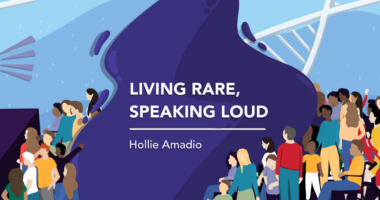Oh, the relief that comes when an educated expert arrives to help
Rejoicing in ER doctors who understand hereditary angioedema symptoms

“Then you know who we have to call,” a character might ominously say while surveying the preliminary damage.
“Who?” another nameless character may ask.
The first character will then stare just off-screen as we cut to our protagonist, cluelessly milling around in their regular life seconds before their phone rings.
That scene has become an action movie trope: A tragic event threatens a small town, a large city, or Earth, and after several days of terrible decisions, a character finally decides to call in the expert to fix the problem.
For example, when rogue weather satellites threaten to wreak more havoc on the world in the movie “Geostorm,” leaders finally call Jake Lawson (Gerard Butler), the satellite’s inventor, to save the day. In the classic movie “Jaws,” police chief Martin Brody (Roy Scheider) persuades the people of Amity Island to give shark expert Quint (Robert Shaw) a chance to capture the ferocious beast that’s terrorizing the beachfront town. And in the action-packed movie “Jurassic Park,” the stranded adventurers realize they should’ve listened to chaos theorist Ian Malcolm (Jeff Goldblum) while desperately trying to escape the doomed theme park.
[recommended-reading id=79811
No, these movies aren’t necessarily winning top awards in screenwriting, but there’s just something about their common theme: Someone educated in the problem can help solve it.
And even in nonfictional situations, relief can occur when an educated expert enters the room.
Taking the time to learn
When our daughter, whom we lovingly call Ladybug, was diagnosed with hereditary angioedema (HAE) in 2021, we needed several months to become educated about the illness. After finally getting over my denial, I read countless articles about HAE symptoms, the subtle signs that gave us clues she was about to have a flare, and various lifestyle changes we could incorporate in addition to administering her preventive and emergency medications.
Yet every time we found ourselves in the emergency room due to a flare, I felt like I was fighting an uphill battle when I would talk to the medical staff. Explaining HAE or diving into Ladybug’s history with the disease became exhausting. I began to loathe the “so tell me what brought you here today” questions. And even though we carry ER toolkits with us, reading wasn’t the best option for nurses and physicians on a busy night.
On one particular evening toward the end of 2021, when Ladybug needed serious medical attention and we’d done everything we could for her at home, I took her to the pediatric ER.
After hours of waiting to see a doctor, one finally arrived, and I sighed before I attempted to launch into my HAE monologue. Surprisingly, the physician stopped me midsentence.
“I know what this is,” she said excitedly. “A few nights ago, I attended a webinar about this. It made me do more research about it.”
I immediately relaxed. Someone else educated in HAE had entered the room. Because of this, we experienced one of Ladybug’s best ER and hospital admissions up to that point.
After that, I realized that while advocacy and education are important for caregivers to take seriously, it’s also essential for physicians, nurses, and other healthcare professionals to take the time to learn about some of the rare diseases that people live with every day.
And if more experts are educated, hospital trips will be easier and diagnoses will come faster, which may get us closer to a world where people who suffer from rare diseases can breathe a little easier.
Note: Angioedema News is strictly a news and information website about the disease. It does not provide medical advice, diagnosis, or treatment. This content is not intended to be a substitute for professional medical advice, diagnosis, or treatment. Always seek the advice of your physician or other qualified health provider with any questions you may have regarding a medical condition. Never disregard professional medical advice or delay in seeking it because of something you have read on this website. The opinions expressed in this column are not those of Angioedema News or its parent company, Bionews, and are intended to spark discussion about issues pertaining to angioedema.






Leave a comment
Fill in the required fields to post. Your email address will not be published.